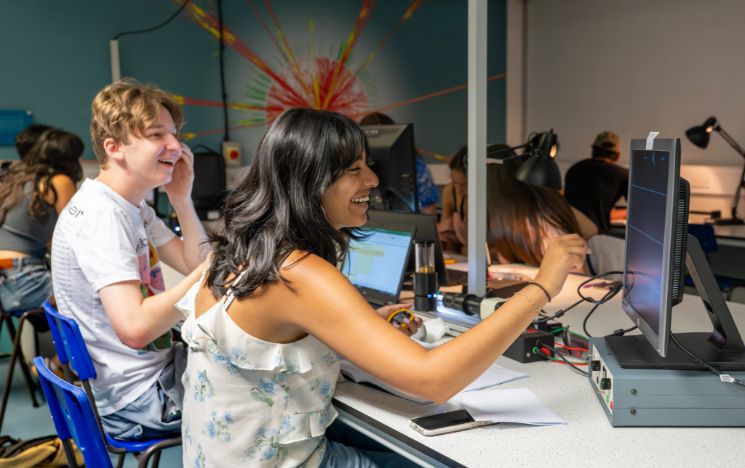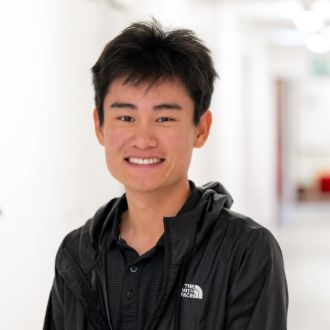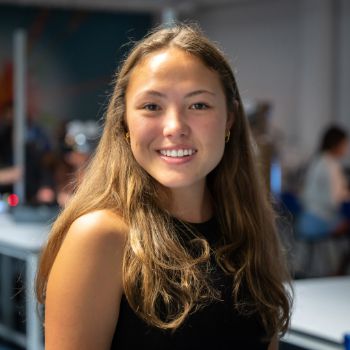Physics Summer School
Join us for the 30th anniversary of the Physics Undergraduate Summer School. Gain confidence, develop skills and improve your academic prospects.

Explore space, time and matter
Sussex’s Physics department was ranked joint 1st in the world for Research Impact and joint 5th in the UK for International Collaboration, in the Shanghai Global Ranking of Academic Subjects 2025.
At our Physics Summer School you’ll learn from academics working at the forefront of physics, from groundbreaking quantum computing to theoretical understandings of space, time and matter.
Our modules are tailored for international students, many of whom will be studying physics at university level for the first time.
Apply for Physics Summer School 2026
Applications for Summer School 2026 are now open!
- Session 1: Monday 29 June - Friday 24 July 2026
- Session 2: Monday 27 July - Friday 21 August 2026
- Session 1 and 2: Monday 29 June - Friday 21 August 2026
Email summer@sussex.ac.uk if you have any questions about the Summer School.

Hao Chun (Ian) Chen
Physics Summer School 2025 student
Read Hao Chun’s Summer School story.
The Summer School Physics programme
- Video transcript
[Intro MUSIC: Fast paced pop rock]
[Video footage of University of Sussex campus from the air]
Hannah: I decided to study physics abroad here at the University of Sussex because we can get the full year of learning Physics completely immersed without worrying about other classes.
Ramneet: The University of Sussex has a great Physics programme, and I was really excited to learn in a place that has such renowned professors and research going on.
Alex: It's really hard to find the time to study abroad and be able to travel. So, this program just was very ideal for me because I was able to do all of Physics in eight weeks.
Sandeep: Doing physics in eight weeks is really challenging, but the ATs and professors here have been really supportive, and it really helps you develop your own study strategies to succeed. In the labs, you learn a lot of practical skills, and you get to use a lot of cool equipment as well. And even when I was traveling abroad during my breaks, you look around and you see physics everywhere.
Esmerelda: Our classes are really small, so it's easier to get more one-on-one attention. And I don't get as nervous when I ask a question because there's not 400 people in a class.
Alex: I've really enjoyed this campus. It's just very, very beautiful out here, and I've been going on runs, I've been going on hikes.
Ramneet: I've never had my own bathroom before, so I love my ensuite. I love living in the flat-style accommodations. My flatmates are amazing, and it gives me a lot of privacy being in my own room.
Sandeep: What's fantastic about being at Sussex is that you're literally at a prime location. You're super close to the pier, and you're less than an hour train ride away from London.
Student 1: The University of Sussex offers a lot of opportunities for trips and travel, so it's really cool that they have it organised for you already. You're traveling with a group; you're not gonna get lost.
Sandeep: I just came back from a trip from Spain and the Netherlands.
Hannah: I've been to Amsterdam. I've also been to Barcelona.
Philmon: I've been to France for three days, and I went to Iceland for two days.
Student 1: I would definitely recommend the physics program here. It is difficult, it is fast-paced, but in the end, it'll be worth it. If you just study for the short amount of time, then you can adventure, travel, and do whatever you want later on.
Esmerelda: Sussex is very quiet. There's cows outside my window. It's very cute, and I just love it.
[Outro MUSIC: Fast paced pop rock]
[Video footage of University of Sussex campus from the air]
Modules you can study
We offer two modules: Introductory Physics 1 and Introductory Physics 2. Each module is a self-contained, credit-bearing unit of study.
Each module carries 15 credits and lasts four weeks (one session). You take one module per session.
You can only take Introductory Physics 2 if you have completed Introductory Physics 1.
Undergraduate Summer School – Physics
- Video transcript
[Woman speaks to camera]
Hi. My name is Dr Jackie Grant, and I'm the Academic Lead on the Physics Summer School.
Our modules are designed specifically for students from Life Sciences and Biomedical backgrounds.
The programme is designed to provide firm foundations for those going on to future careers in medicine and life sciences,
It's essentially a year's worth of physics, taught intensively over eight weeks.
However, you'll be supported throughout by small class sizes, hands on laboratory workshops, and interactive teaching.
There's a real focus on conceptual understanding and application of those concepts.
By the end of summer, you'll have gained confidence in solving real world physics problems. You'll be writing scientific reports, carrying out experiments, and analysing your own data.
The Physics Summer School has been running since 1996. It is the most established programme of its kind in the UK, and we have years and years of experience in supporting students who are new to the subject, studying intensive physics in this way.
Our Physics department sits proudly alongside the School of Life Sciences and the Medical School.
Today I’m in the quantum sensing laboratory where colleagues who teach with me on the summer programme are using fundamental Physics to look at, for example, non-invasive blood flow techniques, nerve cell communications and magnetic fields from neural activity.
These have real world applications from the fundamental physics that we all work on in our Physics department.
Everyone who works on the summer programme is looking forward to welcoming you to our Physics department and to our Physics Summer School.
[End card: fade out of blue, green and purple colours with the University of Sussex logo]
Session One
- Intensive Introductory Physics (1)
Module code: ISP01
This module is suitable for those on Life Sciences, Engineering and Medical pathways. It is also suitable for other pathways with appropriate pre-requisites.
This calculus-based module will provide a firm foundation in physical concepts and principles, covering kinematics and dynamics, fluids, elasticity, wave motion, sound, ideal gases, heat and thermodynamics. Applications of physical concepts will be stressed, particularly those related to biological and medical phenomena as well as those forming the basis of much of modern technology. You gain further insight into the physics taught by carrying out a series of laboratory experiments and learning how to analyse and interpret the data.
Recommendation: This is an intensive module, requiring good mathematical skills, including algebra and trigonometry and a knowledge of vectors and of differential and integral calculus. We also recommend that you view our Maths preparation and Excel training. Please check with your home institution that your mathematics is at an appropriate level.
Note: This is an intensive academic module. For a 15-credit module taken over four weeks you need to do about 85 hours of self-study over and above the scheduled 65 contact hours. This means that you should be working for about 20-25 hours per week, on average, in addition to attending classes. You need to bear this in mind when planning trips and travel and outside class.
Learning outcomes:
- have a basic knowledge of the physics topics covered in the course
- be able to solve physics problems at the appropriate level which requires use of this knowledge
- be able to demonstrate familiarity with simple scientific equipment, make accurate measurements, keep records of observations, analyse and interpret data and write scientific reports on experiments.
Teaching method: Laboratory, lectures and workshops
Assessment: 65% exams, 25% practical laboratory reports, 10% in-class tests
Contact hours: 82 hours, with 28 hours additional support, totalling 110 hours
Credits: 15 Sussex Credits
Level: 4
Session Two
- Intensive Introductory Physics (2)
Module code: ISP02
You can only take this module if you have completed Intensive Introductory Physics (1).
This calculus-based module will provide a firm foundation in physical concepts and principles, covering electric forces and electric fields, continuous charge distributions, Gauss’s Law, electric potential, capacitance and dielectrics, current and resistance, DC circuits, magnetic fields, force on a charge moving in a magnetic field, charged particle moving in electric and magnetic fields, sources of the magnetic field, Faraday’s law and induction, AC circuits, EM waves, the nature of light and principles of ray optics, image formation and lenses, wave optics and diffraction patterns, introduction to quantum physics, the uncertainty principle, atomic physics, nuclear physics and radioactivity. Applications of physical concepts will be stressed, particularly those related to biological and medical phenomena as well as those forming the basis of much of modern technology. You gain further insight into the physics taught by carrying out a series of laboratory experiments and learning how to analyse and interpret the data.
Recommendation: This is an intensive module, requiring good mathematical skills, including algebra and trigonometry and a knowledge of vectors and of differential and integral calculus. We also recommend that you view our Maths preparation and Excel training. Please check with your home institution that your mathematics is at an appropriate level.
Note: This is an intensive academic module. For a 15-credit module taken over four weeks you need to do about 85 hours of self-study over and above the scheduled 65 contact hours. This means that you should be working for about 20-25 hours per week, on average, in addition to attending classes. You need to bear this in mind when planning trips and travel and outside class.
Learning outcomes:
- have a basic knowledge of the physics topics covered in the course
- be able to solve physics problems at the appropriate level which requires use of this knowledge
- be able to demonstrate familiarity with simple scientific equipment, make accurate measurements, keep records of observations, analyse and interpret data and write scientific reports on experiments
Teaching method: laboratory, lectures and workshops
Assessment: 65% exams, 25% practical laboratory reports, 10% in-class tests
Contact hours: 82 hours, with 28 hours additional support, totalling 110 hours
Credits: 15 Sussex Credits
Level: 4

Physics Summer School Student 2025
Read Sidney’s Summer School story.
Contact
If you have any questions about the Physics Summer School email summer@sussex.ac.uk.